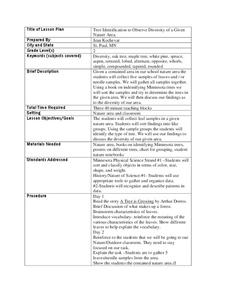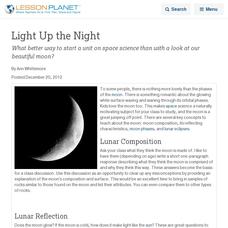Curated OER
Theory, Theory, Who's got the theory?
Students analyze 5 separate theories of evolution in order to help them explain the different meanings of theory, how human values influence science, and that the scientific view of the origin of life does not involve supernatural forces.
Curated OER
Archaeology
Students compare and contrast the role of scientists with that of archaeologists. They also describe the roles of observations and evidence in science.
Curated OER
Writing Myths
Students read and write myths. In this world mythology lesson, students read and analyze myths from various cultures and then recognize their attributes as they write their own myths that explain natural phenomena.
Curated OER
Stream Table
Students explore channelization, riparian habitats and soil erosion to find out about the aquatic habitats in Iowa. In this aquatic habitats lesson, students define important terms and read an article about pollution. ...
Curated OER
The Selection and Variation in the Egyptian Origami Bird
Students participate in a contrived natural selection simulation in which they build and modify simple paper airplanes. They study divergent and convergent evolution and how it is isolated in sub-populations.
Curated OER
A World of Myths
Students read and write myths. In this world mythology lesson, students read and analyze myths from various cultures and then recognize their attributes as they write their own myths to explain natural phenomena.
Curated OER
Elements of Myth
Students read and act out myths. In this world mythology lesson, students read and analyze myths from various cultures and then recognize their attributes as they prepare presentations of myths that explain natural phenomena.
Curated OER
Habitat Sunprints
Students recognize various habitats and where they are found. In this habitat sunprints lesson, students observe the contents of habitats and record what the sunprint might represent. Students use blueprint...
Curated OER
Our Zoo Friends
First graders plan and create a model zoo depicting the natural habitats of animals. Their models include animals and a display of written factual information about the animals. Students present their project by conductig a tour of...
Curated OER
Scientific Data: It's Not as Pretty as It Looks!
The difference between accuracy and precision is fundamental for high school science learners. Using test kits for nitrate concentration in water, they compare readings with each other. They consider the accuracy, precision, and bias of...
Curated OER
Ecology Integration Using IMovie
Amazing! Any 5th grader would be more than willing to participate in this project. Students are broken into groups, each group reads one book from a list of five. They use their book as the basis for choosing an animal and environment to...
University of Georgia
What's So Special about Bottled Drinking Water?
Is artesian water designed to be better, or is it just from wells similar to those in the city of Artesium? This experiment looks at many different types of bottled waters, including artesian. Using a soap mixture, scholars test to see...
Curated OER
Tree Identification to Observe Diversity of a Given Nature Area
In this tree identification lesson, 2nd graders read A Tree is Growing, discuss what makes up a forest, brainstorm characteristics of leaves, gather samples of leaves and examine their samples. Students will sort leaves and compare them...
Curated OER
The Integration of Science and Math Through Ecosystems
Students use the disciplines of math and science to examine ecosystems. In groups, they calculate the amount of supplies they would need to live in the classroom for one day, a week and a year. Using this information, they apply it to...
Curated OER
Water Conservation
Students investigate water conservation. In this water conservation lesson, students list the uses for water and record their water usage for one day. Students graph the data and create a water conservation poster.
Curated OER
Images of Katrina
Learners use maps and online data to find specific geographic areas. In hurricane Katrina instructional activity students use aerial photographic imagery to see some impacts of hurricane Katrina.
Curated OER
Life Science- Useful Waste
Fourth graders explore the topic of waste and recycling. In this useful waste lesson, 4th graders classify objects and sort them into most usable and least usable categories. Students complete an activity sheet and have a discussion on...
Curated OER
Definition and Applications of Computational Science
Students participate in a variety of instructional experiences about Computer Science. They define Computational Science and describe computational simulation. They also compare and contrast Computational Science and Computer Science.
Curated OER
Creative Activities for the Sciences
Students expand their creative outlets. In this science instructional activity, three ideas, including videos, are presented to help get students motivated to think creatively and express themselves.
Curated OER
Come Shine with Us: Floor Polish Testing and Industrial Science To Teach Critical Thinking
Young scholars discover that science relates to everyday life and see testing procedures used in an industrial laboratory. Students compare various brands of household and industrial floor polishes for specific criteria.
Sargent Art
Protect Our Marine Life
Encourage water conservation and boost art skills with a hands-on activity that challenges young painters to create a scene highlighting marine life. Using oil pastels, scholars draw an underwater scene and write a tip for viewers to...
Curated OER
Excite the Night with a Look at the Moon
What better way to start a unit on space science than with a look at our beautiful moon?
Code.org
Number Systems
Generating a system of shapes. Groups work together to create a number system using three different shapes as symbols. The groups should come up with the rules that generate all the possible permutations of the three shapes.
Code.org
Cleaning Data
"Clean the data!" "I did not know it was dirty." Introduce your class to the process of cleaning data so that it can analyze it. Groups work through a guide that demonstrates the common ways to filter and sort data. Pairs then...

























